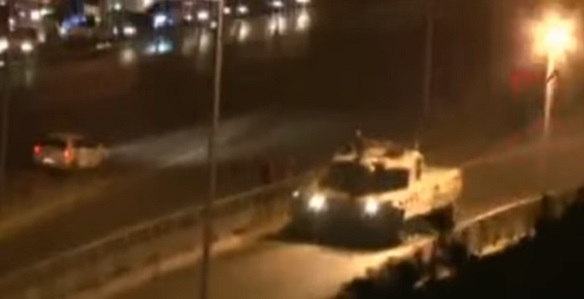Reports coming out of Turkey far into the night indicate only that the picture is still very confused. Many of the reports are tweets from eyewitnesses: although these give an immediate picture of episodes happening on the ground, it is hard to piece together an overall picture and detect a pattern.
There was conflict about the scale of the coup from the start – while one part of the military were watching their statement being read out on TRT (Turkish state TV), the Prime Minister was on another channel calling on other parts to take action to defeat the coup and restore power to the elected Government.
President Erdogan, who was on holiday in Marmaris when the coup began, quickly began to Facetime Turkish TV. Presenters held up their mobiles to the cameras so that the President could give an emergency address to the people – in which he urged them to take to the streets to defend Turkey from the coup. The military responded by declaring martial law and imposing a curfew, which many protestors went on to ignore. Erdogan continued popping up on journalists’ mobiles, insisting that the Government remained in control and urging the people to protest. Less than an hour after the coup began, the military entered the TRT office and the station went off air.
There were reports that all social media appeared to be blocked, or at least not working properly – but both the President and Prime Minister appeared to be tweeting quite freely.
Which parts of Turkey have been affected?
Reports of military action are coming from three main centres.
•In Istanbul, the coup-supporting military is out on the streets. They are stopping people from travelling across the Bosphorous between the European side of the city on the left bank and the Asian side of the city on the east of the river. There were reports that protestors trying to cross the bridge had been shot and that two of them had been killed. Explosions and gunfire have been heard. Armed soldiers appear to have rounded up police officers in some parts of the city. Flights to and from Istanbul have been halted, with tanks surrounding the airport. As the night wore on, there were reports of heavy fighting around the city’s police HQ. As Erdogan supporters flocked to Taksim Square in the city centre, the military began to take on the crowd and appeared to be using force to stop other protestors from joining them – as well as trying to keep the media away. The call to prayer was heard a full nine hours early – as mosques appeared to be organising the public to defend the elected government.
•In Ankara, the Turkish capital, military aircraft flew over the city and there are reports they have been firing at the headquarters of the national intelligence agency. Tanks are circling the airport. People have reported hearing gunfire, especially near the presidential compound, and at least one massive explosion. Protestors appear to be trying to make their way to the parliament buildings, which is surrounded by tanks sent by the leaders of the coup and after midnight there were reports of explosions in the area. There are reports of police officers being killed in a sustained attack from military forces. Some parts of the military which have remained loyal to Erdogan have been flying over Ankara and attacking helicopters being used by coup supporters – at least one of which has been shot down. There are also reports that a member of the Government has entered the state TV offices with the support of civilian protestors.
•In Antalya, anarchy appears to have broken out as the emergency services have dominated petrol stations which people ignore the curfew as they try to collect food and other essential supplies. Imams were heard telling those praying to take to the streets.
How have other countries responded?
Foreign reaction was swift. Within minutes of the army declaration, US Secretary of State John Kerry made a statement calling for “peace and stability” in Turkey – but which fell short of condemning the coup or defending the elected government. Minutes later, Russian Foreign Minister Sergei Lavrov was calling for a peaceful solution to be found to avoid further bloodshed – which again avoided taking a direct position on events.
An hour after the military statement, Federica Mogherini, the EU’s head of Foreign Affairs, called for restraint and respect for the democratic institutions of Turkey. Half an hour later, new British Foreign Secretary Boris Johnson MP tweeted that he was “very concerned” and asked people to follow the Foreign Office website. It was nearly three hours before the UN Secretary General Ben Ki-moon commented: he made a general appeal for calm.
How did it come to this?
The Turkish military who were leading the coup said that they had taken action to safeguard Turkey’s democratic and secular society, which it said that was in danger from the government. Whether the Government is defending Turkey’s secular state or undermining it has been a constant public debate for years. Nonetheless, the military action seems to have taken everyone by surprise. It is nearly 20 years since there was last a military coup in Turkey.
President Erdogan referred to the coup having been organised by a “parallel structre”. This is taken to be a reference to Fethullah Gulen, an Islamic cleric who is based in the US and who leads the Hizmet movement (which the Turkish Government refers to as “Feto”). Gulen openly promotes the kind of moderate Islam which would be superficially attractive to the US – but some commentators believe this is being used as a cover for a sophisticated attempt to take over Turkey which has been months or years in the planning. However, Fethullah Gulen has condemned the coup and denied that it is involved.
As the night wears on, it seems that those leading the coup constitute only a small part of the military and they may well be defeated by troops loyal to the elected government. However, the fact that such a large scale attack on Turkey has been mounted within the country will do nothing to calm the situation in the Middle East or improve relations between the world’s superpowers.
[Adverts]
 East London News A Force for the community…
East London News A Force for the community…




